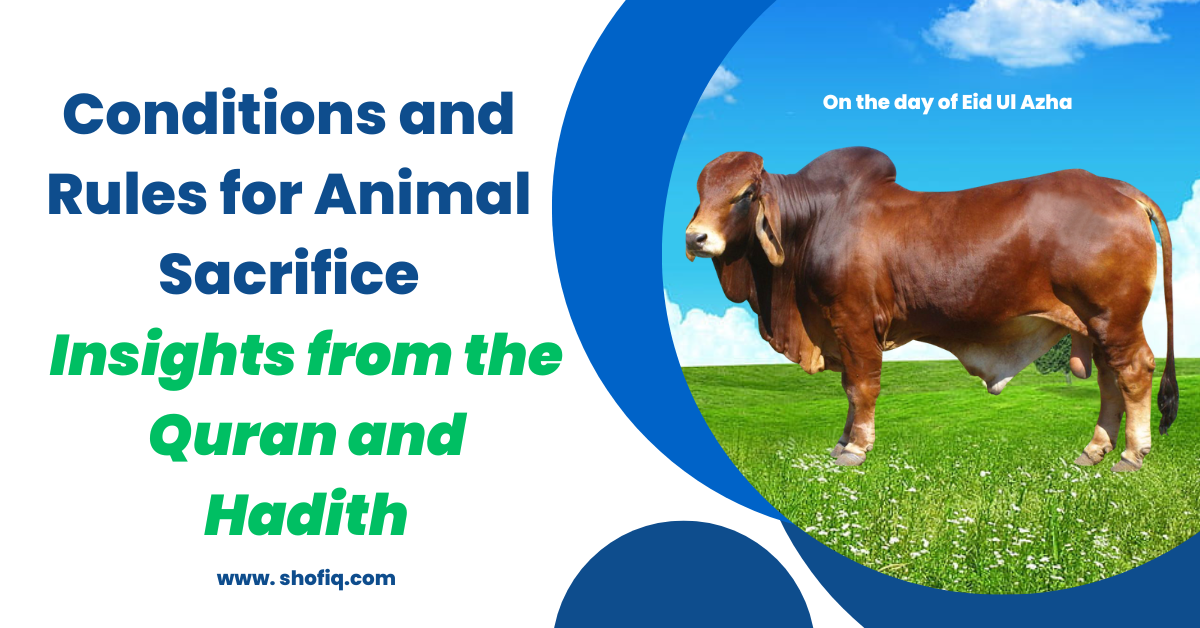Introduction:
Eid-ul-Adha, also known as the Festival of Sacrifice, holds great significance in the Islamic calendar. It commemorates the willingness of the Prophet Ibrahim (Abraham) to sacrifice his son, Ismail (Ishmael), as an act of obedience to God’s command. In observance of this event, Muslims worldwide engage in the ritualistic sacrifice of animals. However, it is crucial to understand the rules and regulations associated with animal sacrifice during Eid-ul-Adha, as prescribed by the Quran and Hadith, to ensure that the act is performed in a manner consistent with Islamic teachings.
Before that, let us know what conditions are applicable while slaughtering animals-
- The person who slaughters animals must be religious (Mumin) and pious (Takwa). He who does not believe in Allah and does not follow Islamic teachings is not qualified to slaughter the sacrificial animal. We often use the butchers to slaughter the sacrificial animals which should not be done at all. It occurs in urban areas. But if the butcher is a believer and pious, then there is no problem.
- The animal should drink enough water before slaughtering the sacrificial animal. Sacrificial animals should never be slaughtered without drinking water. It has two advantages- one. Animals are slaughtered in a manner prescribed by Allah that pleases Allah Subhanahu wa Ta’ala, two. Watering the animal before slaughter allows the skin to separate easily and the blood inside the meat is completely drained.
- After watering the animal should be properly tied so that the animal cannot escape during slaughter and care must also be taken that the animal does not suffer during tying.
- After being properly tied, the animal should lie facing the Qibla.
- The knife used for slaughter must be very sharp so that the animal does not suffer during slaughter.
- At the time of slaughtering, should be recited, Qurbani Dua and Bismillah Allahu Akbar. Many people do not consider reciting Qurbani dua as important which is not right. The Dua of Qurbani is given below-
The dua is narrated from Imam Ali (a.s.). He said before slaughtering the sacrificial animal one should say:
بِسْمِ اللَّهِ وَ اللَّهُ أَكْبَرُ- وَجَّهْتُ وَجْهِيَ لِلَّذِي فَطَرَ السَّماواتِ وَ الْأَرْضَ حَنِيفاً مُسْلِماً وَ مَانَا مِنَ الْمُشْركِينَ- إِنَّ صَلاتِي وَ نُ سُكِي وَ مَحْيايَ وَ مَMATِي لِلَّهِ رَبِّ الْعالَمِينَ لَشَرِيكَ لَهُ وَ بِذلِكَ أُمِرْتُ وَ أَنَا مِنَ الْمُسْلِمِينَ.
Pronunciation: Bismillahi wallahu akbar- wajjahtu wajhia lillazi fataras sama-wati wa ardwa hanifam muslima wa wama- ana minal mushrikeen, inna salati wa nusuqi wa mahiya wa mamati lillahi rabbil a-lamin la sharika lahu wa bi ja-lika amirtu wa ana minal muslimeen.
At the time of animal sacrifice should be said:
– If he sacrifices on his own behalf then he should say:
أللهمّ تقبّل منی
Pronunciation: Allahumma Takbabbal Minni.
May God accept me
– And if a sacrifice is made on behalf of some then it should be said:
أللهمّ تقبّل منهم
Pronunciation: Allahumma Takbabbal Minhum.
May God accept them
– And if he sacrifices on behalf of himself and some others then he should say:
أللهمّ تقبّل منا
Pronunciation: Allahumma Takabbal Minna.
May God accept us
- We often slaughter many animals at the same place on the day of sacrifice. To do this, animals must be placed in such a way that other animals cannot see the slaughtered animal.
- At the time of slaughtering, the main vein and several other veins are cut and this should be done quickly so that the animal does not feel any pain.
- The animal should be untied as soon as the slaughter is completed.
- After the slaughtering is completed, the skinning of the animal should be started after the complete death of the animal is confirmed.
Now let us discuss the other terms of sacrifice
The Quranic Perspective
The Quran highlights the importance of animal sacrifice as an act of devotion and submission to God. It emphasizes the intention behind the act, stating,
لَنۡ یَّنَالَ اللّٰهَ لُحُوۡمُهَا وَ لَا دِمَآؤُهَا وَ لٰکِنۡ یَّنَالُهُ التَّقۡوٰی مِنۡکُمۡ ؕ کَذٰلِکَ سَخَّرَهَا لَکُمۡ لِتُکَبِّرُوا اللّٰهَ عَلٰی مَا هَدٰىکُمۡ ؕ وَ بَشِّرِ الۡمُحۡسِنِیۡنَ ﴿۳۷﴾
” Their meat will not reach Allah, nor will their blood, but what reaches Him is piety from you. Thus have We subjected them to you that you may glorify Allah for that [to] which He has guided you; and give good tidings to the doers of good.” (Quran 22:37).
This verse emphasizes that the essence of sacrifice lies not in the physical offering but in the sincerity and righteousness of the one making the sacrifice. The Quran also emphasizes the principle of moderation and balance, advising Muslims not to engage in extravagant or wasteful practices.
The Hadith and Prophetic Tradition
The Hadith, the recorded sayings and actions of the Prophet Muhammad (peace be upon him), provide further guidance on the rules and regulations of animal sacrifice. The Prophet Muhammad himself performed animal sacrifice during Eid-ul-Adha, setting an example for Muslims to follow. The Hadith emphasizes the importance of choosing healthy animals for sacrifice and treating them with kindness and compassion. It is narrated that the Prophet Muhammad said, “Verily Allah has prescribed proficiency in all things. So, if you kill, kill well; and if you slaughter, slaughter well. Let each one of you sharpen his blade and let him spare suffering to the animal he slaughters” (Sahih Muslim).
Guidelines for Animal Sacrifice
- Intention: The primary intention behind animal sacrifice during Eid-ul-Adha should be to seek nearness to Allah and demonstrate obedience to His commands. The act should not be driven by vanity, showmanship, or a desire to compete with others.
- Animal selection: The animal chosen for sacrifice should meet specific criteria, including being of a certain age, in good health, and free from any defects that render it unsuitable for sacrifice. The animal should be treated with kindness and care throughout its life.
- Slaughtering process: The slaughtering of the animal should be carried out in a humane and respectful manner. The knife used for the sacrifice should be sharp to minimize suffering and distress to the animal. The throat, windpipe, and blood vessels should be severed with a swift and precise motion to ensure a quick and painless death.
- Distribution of meat: The meat from the sacrificed animal should be divided into three equal parts: one for the individual or family performing the sacrifice, one for relatives and neighbours, and one for the less fortunate and those in need. This distribution ensures that the act of sacrifice serves a charitable purpose and fosters community solidarity.
- Personal hygiene and cleanliness: Those participating in the sacrificial process should maintain personal hygiene and cleanliness at all times. Proper handwashing and cleanliness of the utensils used in the process are essential.
I think we need to have some discussion about the sacrificer
The act of sacrificing an animal holds great significance in Islam, particularly during the occasion of Eid-ul-Adha. This act is not only a demonstration of devotion and obedience to Allah, but it also reflects the character and qualities of the person performing the sacrifice. Drawing guidance from the Qur’an and Hadith, we can explore the characteristics of an individual who embodies the true spirit of sacrifice.
- Faith and Devotion
A person who sacrifices an animal in accordance with Islamic teachings is characterized by deep faith and devotion to Allah. Their act of sacrifice stems from a sincere belief in the commandments of Allah and a desire to please Him. They understand that the act of sacrifice is an act of worship, symbolizing their submission and dedication to the Almighty.
- Righteousness and Piety
The individual who engages in animal sacrifice with the right intentions embodies righteousness and piety. They strive to lead a virtuous life, adhering to the principles of Islam and seeking to emulate the Prophet Muhammad’s (peace be upon him) example. Their actions are guided by a sense of moral responsibility and a commitment to living in accordance with Allah’s commands.
- Compassion and Kindness
The Qur’an and Hadith emphasize the importance of treating animals with compassion and kindness. A person who truly understands the spirit of sacrifice demonstrates these qualities throughout the process. They ensure the animals are well cared for, providing them with adequate food, water, and shelter. They handle the sacrifice with empathy, ensuring that the animal does not suffer unnecessarily, and carrying out the act swiftly and skillfully.
- Humility and Modesty
A person who sacrifices an animal in the light of the Qur’an and Hadith exemplifies humility and modesty. They do not engage in the act for personal gain, recognition, or to display wealth or status. Instead, they approach the sacrifice with humility, recognizing that all blessings come from Allah. They maintain a modest demeanour, refraining from boasting or seeking attention for their actions.
- Generosity and Charity
The act of sacrificing an animal during Eid-ul-Adha involves the distribution of meat to family, friends, and the less fortunate. A person who embodies the teachings of the Qur’an and Hadith is characterized by generosity and charity. They willingly share the blessings bestowed upon them, recognizing the importance of helping those in need and fostering community solidarity.
- Patience and Perseverance
Sacrificing an animal requires patience and perseverance, especially during the preparation and execution of the act. The person who engages in this act with the teachings of the Qur’an and Hadith in mind displays these qualities. They endure any challenges or difficulties that may arise, remaining steadfast in their commitment to fulfilling the act of sacrifice in a manner pleasing to Allah.
The act of sacrificing an animal in accordance with the teachings of the Qur’an and Hadith is not just a physical ritual but a reflection of one’s character and qualities. A person who truly embodies the spirit of sacrifice demonstrates faith, righteousness, compassion, humility, generosity, patience, and perseverance. By internalizing these characteristics, individuals can deepen their connection with Allah, nurture their own spirituality, and serve as positive example within their communities.
At last, it can be said
The rules and regulations of animal sacrifice on the occasion of Eid-ul-Adha are firmly rooted in the teachings of the Quran and the Prophetic tradition. It is crucial for Muslims to adhere to these guidelines to ensure that their acts of sacrifice are conducted in a manner that is pleasing to Allah and
consistent with the principles of compassion, justice, and moderation. By understanding and practising these rules, Muslims can truly embody the spirit of sacrifice and exemplify the virtues of empathy and care towards animals and their fellow human beings.







মন্তব্য করুন